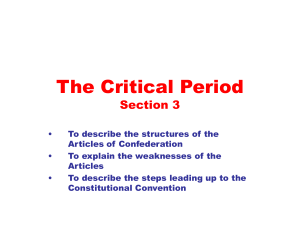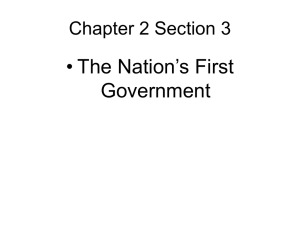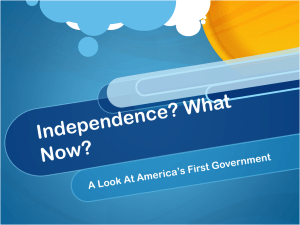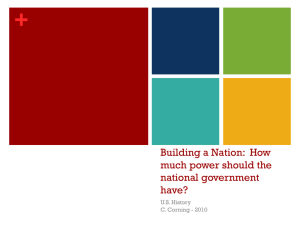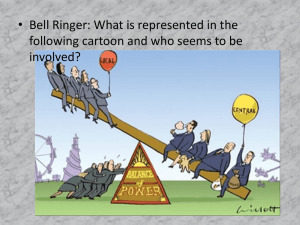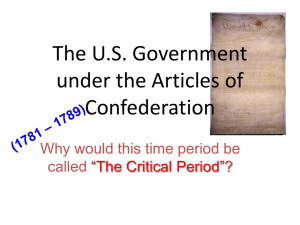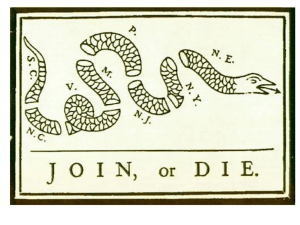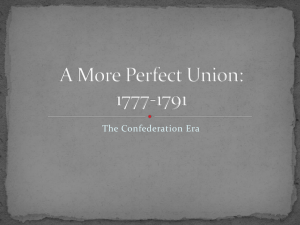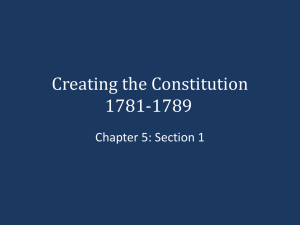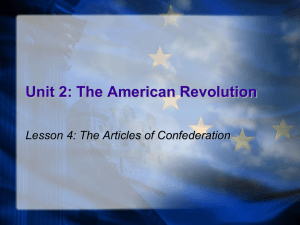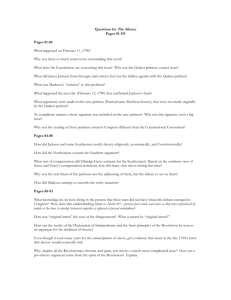Chapter9, “The Confederation and the Constitution, 1776
advertisement
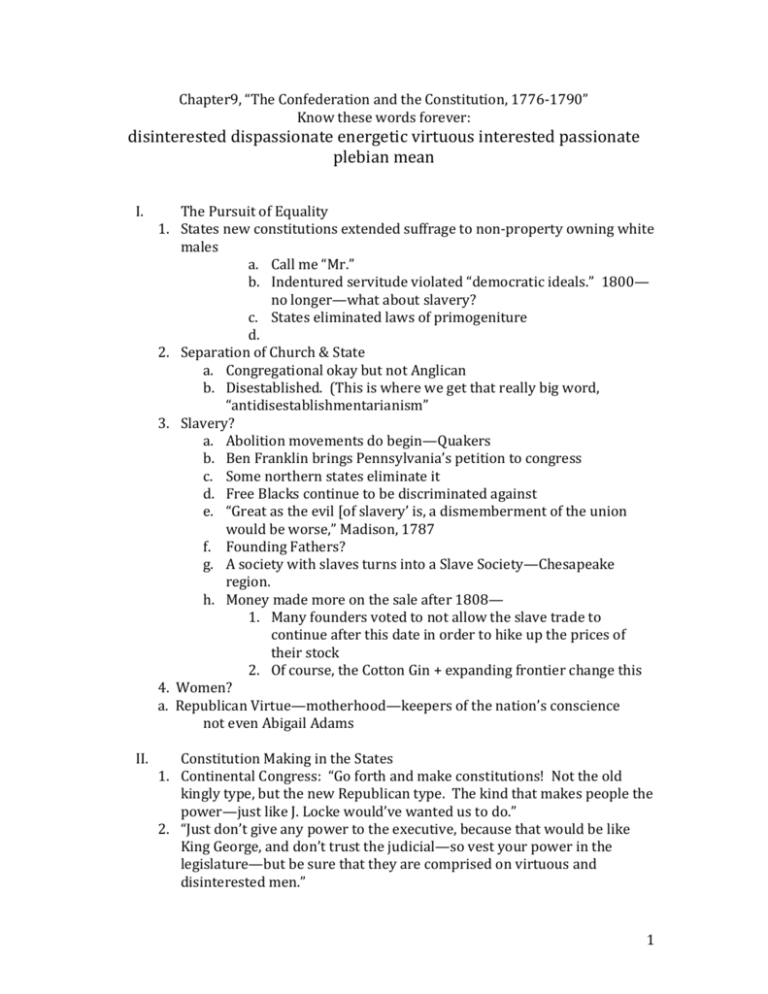
Chapter9, “The Confederation and the Constitution, 1776-1790” Know these words forever: disinterested dispassionate energetic virtuous interested passionate plebian mean I. The Pursuit of Equality 1. States new constitutions extended suffrage to non-property owning white males a. Call me “Mr.” b. Indentured servitude violated “democratic ideals.” 1800— no longer—what about slavery? c. States eliminated laws of primogeniture d. 2. Separation of Church & State a. Congregational okay but not Anglican b. Disestablished. (This is where we get that really big word, “antidisestablishmentarianism” 3. Slavery? a. Abolition movements do begin—Quakers b. Ben Franklin brings Pennsylvania’s petition to congress c. Some northern states eliminate it d. Free Blacks continue to be discriminated against e. “Great as the evil [of slavery’ is, a dismemberment of the union would be worse,” Madison, 1787 f. Founding Fathers? g. A society with slaves turns into a Slave Society—Chesapeake region. h. Money made more on the sale after 1808— 1. Many founders voted to not allow the slave trade to continue after this date in order to hike up the prices of their stock 2. Of course, the Cotton Gin + expanding frontier change this 4. Women? a. Republican Virtue—motherhood—keepers of the nation’s conscience not even Abigail Adams II. Constitution Making in the States 1. Continental Congress: “Go forth and make constitutions! Not the old kingly type, but the new Republican type. The kind that makes people the power—just like J. Locke would’ve wanted us to do.” 2. “Just don’t give any power to the executive, because that would be like King George, and don’t trust the judicial—so vest your power in the legislature—but be sure that they are comprised on virtuous and disinterested men.” 1 3. Ooops, interested men start comprising the state legislatures. Book talks about the uncouth frontier west (Western New York, Mass., Penn. NOT the West.” Just know that the power in the states began to be made up of the “middling sorts.” Not those virtuous, dispassionate gentlemen of leisure. 4. Alarm bells ring in all the Revolutionary Father’s heads—even the democratic Jefferson, “173 despots [in legislature] would surely be as oppressive a one.” Madison is most alarmed. Remember, Jefferson & Madison turn out to be the Generalissimo & General of the DemocraticRepublican turns Republican Party. How can these sentiments hold true? The people as despots? III. Economic Crosscurrents 1. States seize Loyalist land and divide 2. “The frightful excesses of the French Revolution were avoided partly because cheap land was available. People do not chop off heads so readily when they can easily chop down trees,” (169) 3. Economic democracy preceded political democracy—textbook thinks this is major—it is, but it isn’t quite so democratic. Democratic for whom? Women? Native Americans? Free Blacks? Enslaved people? Economic opportunities were prevalent for white guys before political opportunities were. However . . . 4. Manufacture stimulated by pre-war time No importation agreements 5. Mostly Yeoman farmers—That’s the American dream and never forget it. Independence is not being beholden on anybody—no boss! Have land and be independent! (Jeffersonian vision) 6. War brought hardships for shipping enterprises. England continued to trade with their other holdings, not US, yet. 7. However, now Americans could trade with others—no navigation laws here. Go east and trade young sailor . . .! 8. Economic outlook for most worse after war. a. Speculation & profiteering b. Inflation c. Debt d. Newly rich class of profiteers—v. “broke” old monied class e. Taxes a bad word . . . f. Mrs. Hall farmer story . . . IV. A Shaky Start Toward Union What would the new nation look like? Unity—not really there, suspicion of aristocrats—monarchical tendencies . . . During the war, the Revolutionary leaders united around a common cause—a common enemy—now that was gone An uneasy feeling sets in . . . common enemy is gone. You can relate British surplus goods in manufactures flood markets with cut-rate prices. Really hurt new American industries 1. 2. 3. 4. 5. 2 6. Hard Times—yet hopeful— a. Similar state governments b. British model of representative government c. Political leaders—Founding Brothers—who are they? V. Creating a Confederation 1. Article of Confederation-- adopted in 1777—ratified in 1781— a. Western land disputes—please look at page 173 b. Why not turn the whole western area in dispute over to the central government and pay off debts? c. Unanimous approval of Articles was needed for ratification 1. Maryland wanted more land and held out 2. Maryland gave in when New York did 3. Congress pledged to “dispose” of these lands for the common benefit 4. Northwest Ordinance of 1787—make states not colonies 5. Westward pioneers now dealing with the federal government in paying for lands= uniform national land policy VI. The Articles of Confederation: Americas First Constitution 1. “Firm league of friendship” 2. Articles a. 13 independent states b. Linked together for joint action such as wars c. Have a congress d. Have no executive e. Judicial left to states f. Congress/legislative dominant but not real power—WEAK 1. Each state = 1 vote 2. Amendments of the Articles required unanimous ratification 3. Congress no power to regulate commerce—states could legislate crippling tariffs 4. Congress could not enforce tax collection program 5. Tax quota for each state—please contribute 6. Lucky if the feds received a quarter of what it asked for 3. More Weaknesses in Action: a. Could advise, advocate and appeal—but it could not command, control, or coerce b. No control over individual citizens c. Could not even protect itself—see book in Pennsylvania soldier 4. Articles Weak—but a model for “loose Confederation” 3 a. Jefferson—comparing it to European governments were like comparing “Heaven and Hell.” b. Needed a Federation—not a Confederation 5. What the Articles did do a. Land Ordinance of 1785 1. Land divided and sold to pay off debt. 2. 36 sections—1 section land sale to go toward public education. b. The Northwest Ordinance of 1787 1. How to govern Norwest Territory 2. 60,000 residents—could apply for statehood 3. Prohibited slavery—but not those that were already there 6. Foreign Relations: (Ugly Duckling?) a. London, “If it sent one [minister] it would have to send 13” b. Tried to control trade with states but happened smuggling happened anyway c. Riled up natives in the frontiers—guns d. Spain closed mouth of Mississippi to Americans 1784—see map on 175 e. French wanted money back f. Pirates in North Africa—when colonies Britain paid the tribute to the DeyVII. Anarchy & Shays’ Rebellion 1. States running amok a. No money b. Boundary quarrels c. Taxes on goods between states d. States printing worthless money—creditors lose (Madison’s concern for the minority—Madison’s contempt for state legislatures getting out of hand) 2. Shays’ Rebellion a. Western Mass—1786 b. Farms repossessed—many Revolutionary War veterans c. Shays + wanted the state to print more money, stop foreclosures, & lighten taxes d. Farmers took to arms to protest—Shays fighting against tyranny e. Wealthy Mass. Citizens raised private army to put them down f. Mass. Legislature passed debtor relief laws 3. Democracy gone wild 4 a. Fear! Mobocracy! “Elected despotism” b. “Unbridled republicanism, it seemed to many of the elite, had fed an insatiable appetite for liberty that was fast becoming license” c. Idea of civic virtue & republicanism seemed to be replaced by rampant interests d. Talk of restoring monarchy came up 4. What to do? a. “Cement to the Union” & “A hoop to the barrel” b. Things getting a bit better . . . but Annapolis anyway—not a good party. c. Hamilton saves the day! “We will convene in Philadelphia next year “for the sole and express purpose o revising the Articles of Confederation.” d. “A convention of Demigods” All the biggies were there—but no Adams or Jefferson e. Long hot Philadelphia summer. Keep Franklin quiet Hamilton Quote page 177 & Jefferson Quote f. Also see page 178-188—how the authors lay out who were Founding Fathers—kind of a weird way to look at it—but it works g. What they wanted to do 1. Preserve the Union 2. Forestall anarchy 3. Ensure life and property against the mob 4. Curb in the states that were going wild “Fear occupied fifty-sixth chair” VII. 1. 2. 3. 4. 5. 6. 7. Hammering out a Bundle of Compromises Scrap the old Articles Virginia plan—bicameral legislature based both on population—large states New Jersey plan—equal representation in a unicameral Congress “Great Compromise” Cooler heads with cooler weather Other compromises—“Electoral College” not direct election of the executive 3/5 plan for representation and taxation Congress could end slave trade (not slavery) at the end of 1807 VIII. Safeguards for Conservatism 1. Delegates in agreements: a. Economically—sound money and protection of property b. Politically—stronger government with 3 branches & checks and balances 5 c. Manhood suffrage democracy went too far. “Democratck babblers” were to be feared. d. Safeguards against the “Mob” 1. Judges for life 2. President indirectly 3. Senators indirectly by state legislatures 4. Only house chosen by direct vote 5. Still republic—limited government—“We the people . . .” IX. Clash of Federalists v. Ant federalists 1. Wanted unanimous ratification—as required by Articles- but Rhode Island wasn’t playing so they changed the rules. 2. When 9 of the 13 ratified Constitution became law there 3. “Motley crew of antifederalists”—backwoodsmen and poorer sorts 4. Federalists—“Silver-buckled federalists”—influence & power X. Great Debate in the States 1. Small states ratify—Delaware first 2. Pennsylvania first big state—then Mass, more followed & New Hampshire 3. Holdouts: Virginia, New York, North Carolina, and Rhode Island 4. Had to get NY and Virginia 5. New York finally – others follow XI. A Conservative Triumph Why 6
